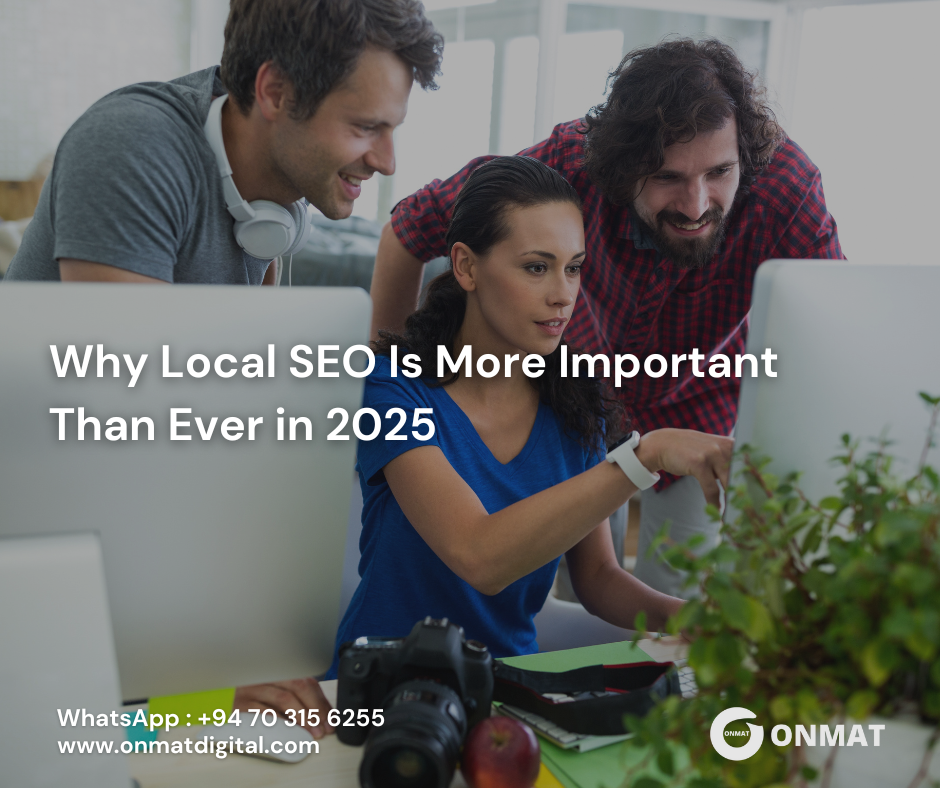In 2025, the digital marketing landscape continues to evolve, and local SEO has become a crucial strategy for businesses looking to attract nearby customers. With the rise of mobile searches, voice assistants, and location-based services, optimizing for local search is no longer optional—it’s essential. Here’s why local SEO matters more than ever and how businesses can leverage it to stay competitive.
What Is Local SEO?
Local SEO (Search Engine Optimization) focuses on improving a business’s visibility in local search results. It helps potential customers find your business when searching for products or services near their location.
Example: A query like “best coffee shop near me” will display businesses close to the searcher’s location, thanks to local SEO.
Why Local SEO Is Crucial in 2025
1. Increase in Mobile Searches
- Stat Alert: Over 70% of online searches are now conducted on mobile devices.
- Why It Matters: People rely on their phones to find nearby businesses, making it essential for your business to rank high in local results.
2. Growth of Voice Search
- Virtual assistants like Alexa, Siri, and Google Assistant are more popular than ever.
- Common Queries: “Where’s the nearest pizza place?” or “What’s the best florist nearby?”
- Tip: Optimize for conversational keywords to capture voice search traffic.
3. Focus on Personalized Experiences
- Consumers prefer businesses that meet their specific needs.
- Example: Showing up in “near me” searches increases your chances of attracting ready-to-buy customers.
4. Rising Competition in Local Markets
- Local SEO levels the playing field, allowing small businesses to compete with larger brands by targeting a specific geographic area.
How to Optimize for Local SEO in 2025
1. Claim and Optimize Your Google Business Profile (GBP)
- Why: GBP is the foundation of local SEO. It ensures your business appears on Google Maps and local search results.
- Steps to Optimize:
- Provide accurate contact information.
- Add high-quality photos of your products or services.
- Regularly update your business hours.
2. Use Location-Specific Keywords
- Examples: Instead of “best bakery,” use “best bakery in [city/neighborhood].”
- Tip: Add these keywords naturally to your website’s content, meta tags, and headers.
3. Build Local Backlinks
- Collaborate with local blogs, directories, and organizations to earn backlinks that boost your credibility.
4. Encourage Online Reviews
- Positive reviews on Google, Yelp, and other platforms help improve your rankings.
- Pro Tip: Respond to all reviews, both positive and negative, to show you value customer feedback.
5. Create Locally Relevant Content
- Ideas:
- Blog about local events or industry news.
- Highlight community involvement.
- Why It Works: It positions your business as a trusted part of the community.
6. Optimize for Mobile and Voice Search
- Ensure your website is mobile-friendly and loads quickly.
- Use natural, conversational phrases to target voice search queries.
Industries That Benefit Most from Local SEO
- Restaurants and Cafes: Attract diners searching for “best lunch near me.”
- Retail Stores: Drive foot traffic with “clothing shops nearby” queries.
- Service Providers: Plumbers, electricians, and other local services gain visibility for “emergency plumber in [city].”
- Healthcare Providers: Doctors, dentists, and clinics thrive with local SEO for terms like “dentist near me.”
Emerging Trends in Local SEO for 2025
1. Hyper-Local Targeting
- Businesses are targeting specific neighborhoods or streets rather than entire cities.
2. Augmented Reality (AR) Maps
- AR features in apps like Google Maps provide immersive navigation experiences, making it crucial for businesses to be listed accurately.
3. AI and Local Search
- AI-powered tools are helping businesses predict local search trends and adapt quickly.
Conclusion
Local SEO is a powerful tool for businesses to connect with nearby customers in 2025. With the rise of mobile and voice searches, hyper-local targeting, and AI-driven insights, optimizing for local search is more important than ever.
By claiming your Google Business Profile, using location-based keywords, and creating locally relevant content, you can ensure your business stays ahead in a competitive market. Start prioritizing local SEO today to drive traffic, boost visibility, and grow your business in the year ahead.



